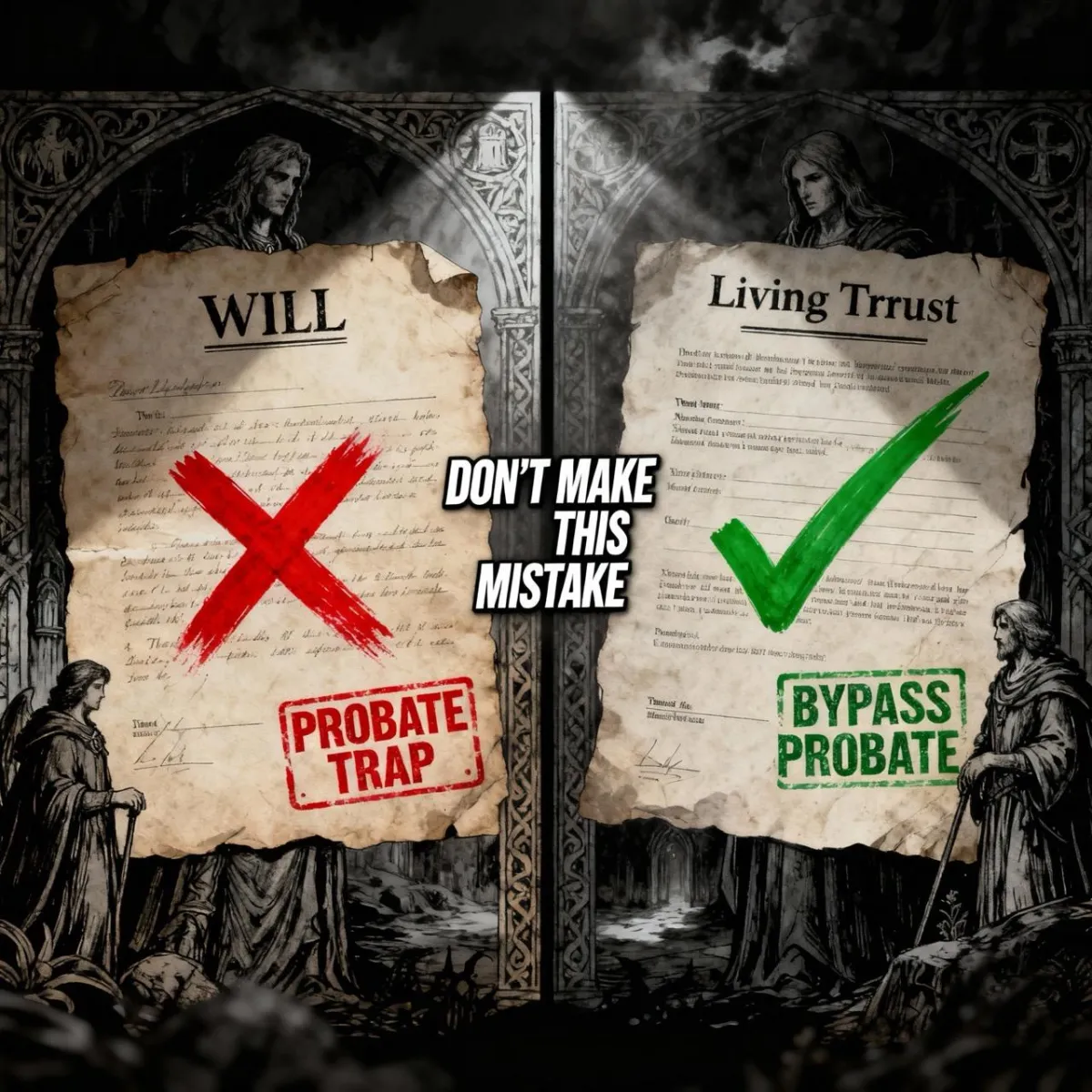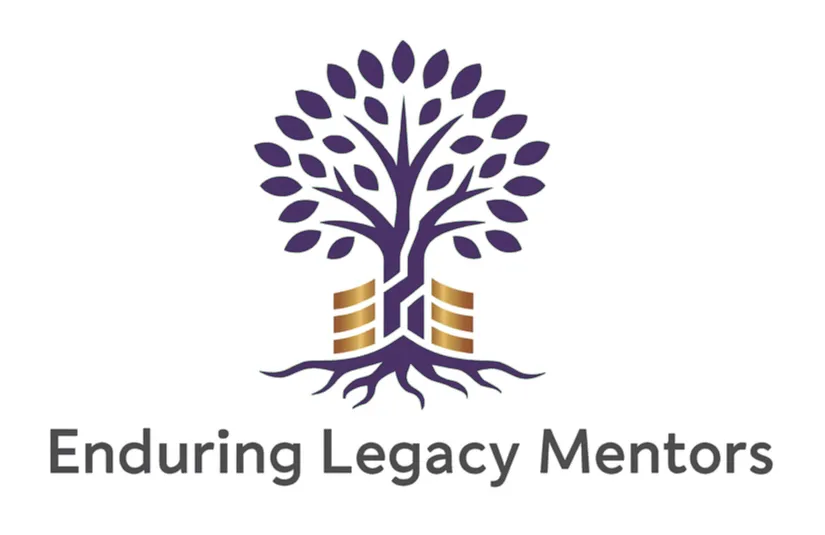
The Difference Between a Will and a Trust (Everything You Need to Know)
What Most People Don't Know About Wills Could Cost Their Family Everything
If you're like most Americans, you probably think having a will means your family is protected. You've checked the box, right? Wrong. The shocking reality is that having a will doesn't keep your loved ones out of probate court—it actually guarantees they'll end up there. And that court process could drain thousands of dollars from the inheritance you worked so hard to leave behind.
The statistics are alarming: only 24% of Americans have a will, and a staggering 55% have no estate plan whatsoever. But here's what's even more concerning—most people who DO have wills don't understand that they're essentially leaving their family's financial future up to the government's plan, not their own.
Understanding the Fundamental Difference: Wills vs. Living Trusts
What Is a Will (Last Will and Testament)?
A will—also called a last will and testament—is fundamentally a wish document. You write down who you want to receive your assets when you die. Sounds simple enough, right? But here's where it gets complicated.
After you die, your will must be validated by probate court. In today's world where fraud is rampant, the probate court must confirm that your will is legitimate and that you actually signed it. Only after the court "blesses" your will can assets be distributed according to your wishes.
The problem? Having a will doesn't keep you out of probate court—it just makes the process slightly easier. Your family will still be dragged through probate, which is exactly what you're trying to avoid.
The Probate Court Nightmare: What Your Family Will Face
Probate court is a public, court-supervised process that can be lengthy, expensive, and emotionally devastating. Here's what actually happens:
Public Exposure: Everything becomes public record. Your assets, debts, beneficiaries—all of it can be accessed by anyone. This is particularly dangerous for mixed families.
Contest Risks: If you have children from a previous marriage but didn't include your ex-spouse in your will, she can see this through public probate records. She can literally pick up the phone and sue your estate, putting your current family through turmoil and grief.
The Financial Hit: Probate costs can range from 5-10% of your estate's total value—and these fees are calculated BEFORE any debts are deducted.
Let's break down what this means in real numbers:
$100,000 estate: $5,000-$10,000 in probate costs
$500,000 estate: $16,000 in statutory fees alone (California), plus court costs
$1 million estate: $50,000-$100,000 total probate expenses
For a $1.5 million estate in California, the statutory fees for both the attorney and executor total $28,000 each—that's $56,000 before any other costs are added.
Time Delays: The probate process can take anywhere from 9-18 months in straightforward cases, and years if there are disputes. More than 50% of circuit court filings in some states are probate cases, which means the court systems move slowly.
Additional Costs Include:
Court filing fees (starting at $435 in California)
Probate referee fees (0.1% of non-cash asset values)
Attorney fees (based on estate value)
Executor fees (same statutory structure as attorney fees)
Appraisal fees for valuable items
Publication fees to notify creditors
Special Risks for Specific Situations
Minor Children: Without a will, or if you don't name a guardian in your will, the court decides who watches your children. Even with a will naming a guardian, the probate process can create delays and complications.
Disabled Children: Special needs planning requires careful coordination to ensure inheritance doesn't disqualify your child from government benefits like SSI or Medicaid.
Multi-State Property Owners: If you own property in multiple states, your executor must initiate probate in EACH state where you own real estate, multiplying costs and complexity.
The Living Trust Solution: Taking Control Back
What Is a Revocable Living Trust?
A revocable living trust is a private legal contract that you create while you're alive (hence "living") that can be changed at any time (hence "revocable"). Here's why it's revolutionary:
Private Contract: Unlike a will, a trust is NOT public record. Your financial affairs remain confidential.
Immediate Protection: The trust takes effect as soon as you sign it and fund it, protecting you during incapacity and after death.
Bypass Probate: Assets held in a properly funded trust completely bypass probate court. The court has no power over your trust.
Full Control: As the grantor and trustee of your revocable living trust, you maintain complete control while you're alive. You can buy, sell, mortgage, or transfer assets freely.
How a Living Trust Actually Works
When you create a living trust, you transfer your assets from your personal name into the trust's name. For example, instead of "Bob and Sue Smith, husband and wife," your assets are titled "Bob and Sue Smith, trustees under trust dated October 21, 2025."
Legally, you no longer personally own these assets—your trust does. But you're the trustee, so you control everything. This is the key mechanism that keeps your family out of probate court.
The Magic Moment: When you die or become incapacitated, your successor trustee (whom YOU named in the trust) immediately steps in to manage or distribute assets according to your instructions. No court approval needed. No public process. No probate.
Advanced Benefits: Control Beyond the Grave
Unlike a will, which simply says "give X to Y," a living trust allows you to attach conditions and protections:
Addiction Protection: You can require that a beneficiary with substance abuse issues pass regular drug tests for 18 months before receiving their inheritance.
Financial Maturity: Instead of giving young adults a lump sum that they'll likely blow through, you can structure distributions over time—at age 25, 30, and 35, for example, or tied to life achievements.
Education Incentives: Require maintaining a minimum GPA in college or completing a degree before distributions are made.
Special Needs Planning: Structure the trust so inheritance doesn't disqualify your disabled child from government support programs like SSI, Medicaid, or housing assistance. They get the benefits of both.
Spendthrift Protection: Protect beneficiaries from creditors or from their own poor financial decisions by controlling when and how they receive funds.
The Pour-Over Will: Your Safety Net
Even with a living trust, you need a special type of will called a "pour-over will." Think of it like pouring water from one container to another.
The pour-over will states that anything you forgot to transfer to your trust, or any new assets you acquired and didn't retitle, will be "poured over" into your trust after your death. These leftover assets will still go through probate, but they'll ultimately be distributed according to your trust's instructions.
Real-World Impact: The Numbers Don't Lie
The estate planning crisis in America is real and growing:
76% of Americans die without a will
55% of Americans have NO estate planning documents at all
Only 11% of Americans have established a trust
Among millennials, 60% have no estate planning documents whatsoever
The number of Americans with wills has DECLINED from 33% in 2022 to just 24% in 2025
Why People Avoid Planning:
43% cite procrastination ("haven't gotten around to it")
38% believe they don't have enough assets
30% don't know where to start
23% feel overwhelmed
18% think it's too expensive
Meanwhile, American retirees expect to transfer more than $36 trillion to their families and beneficiaries over the next 30 years. Without proper planning, much of that wealth will be unnecessarily consumed by probate costs and legal fees.
Living Trust vs. Will: The Side-by-Side Comparison
Timing
Will: Only takes effect after death
Living Trust: Active immediately upon signing and funding
Probate
Will: MUST go through probate (court-supervised, public, expensive)
Living Trust: Bypasses probate entirely (private, fast, cost-effective)
Privacy
Will: Becomes public record; anyone can view your estate details
Living Trust: Remains completely private
Incapacity Protection
Will: Provides NO protection if you become incapacitated
Living Trust: Successor trustee manages assets if you're incapacitated
Control
Will: No control after death; court validates and oversees
Living Trust: You maintain control during life; detailed control over distributions after death
Minor Children
Will: Can name guardians (the ONLY way to do this)
Living Trust: Cannot name guardians; must use a will for this
Costs
Will: Lower upfront ($400-$800), but massive probate costs later
Living Trust: Higher upfront ($3,000-$6,000), but saves tens of thousands in probate costs
Flexibility
Will: Easy to change anytime
Living Trust: Can be changed or revoked anytime (if revocable)
Who Benefits Most from a Living Trust?
While everyone can benefit from proper estate planning, certain situations make living trusts particularly advantageous:
You should strongly consider a living trust if:
You own real estate (especially in multiple states)
Your estate value exceeds $500,000
You have minor children and want to control when they inherit
You have a blended family or complex family dynamics
You want to maintain privacy
You have a family member with addiction issues
You have a special needs child
You own a business
You want to avoid probate delays and costs
You live in a state with expensive probate (California, Florida, New York)
The Complete Estate Planning Strategy: Using Both
Most comprehensive estate plans actually use BOTH a living trust and a will:
Living Trust: Holds and manages the majority of your assets, bypassing probate and maintaining privacy.
Pour-Over Will: Acts as a safety net for any assets not transferred to the trust, and names guardians for minor children.
This combination provides complete protection: probate avoidance for trust assets, guardianship designation for children, and a backup plan for overlooked assets.
Taking Action: Your Next Steps
The difference between probate court and a living trust is the difference between the government's plan and YOUR plan. Here's what you need to do:
Assess Your Risk: Evaluate your current situation. What assets do you have? Do you have a will, a trust, or nothing at all?
Understand the Stakes: Calculate what probate would actually cost your family. Use your state's fee schedule to estimate.
Consult with Professionals: Estate planning isn't one-size-fits-all. Work with an experienced estate planning attorney who can evaluate your unique situation.
Fund Your Trust: If you create a living trust, it's worthless unless you actually transfer your assets into it. This is called "funding" the trust.
Review Regularly: Life changes. Review and update your estate plan when you get married, divorced, have children, acquire property, or experience other major life events.
The Bottom Line
Having a will is better than having nothing, but it's not the comprehensive protection most people think it is. Wills guarantee probate court involvement, public exposure of your private affairs, significant costs, and lengthy delays for your grieving family.
A revocable living trust gives you privacy, avoids probate, protects you during incapacity, and lets you maintain control over how and when your beneficiaries receive their inheritance—even after you're gone.
The choice is yours: leave your family to navigate the probate court circus, or take control with a living trust that protects your legacy exactly as you intend.
Don't wait for a health crisis or life emergency to force your hand. The best time to create your estate plan was yesterday. The second-best time is today.
Ready to protect your family's future? Take our free 2-minute risk assessment quiz to discover whether your assets are in the safe zone, warning zone, or critical risk zone. Then schedule a complimentary 15-minute consultation to discuss your specific situation and explore your options.
Your legacy deserves better than the government's default plan.
